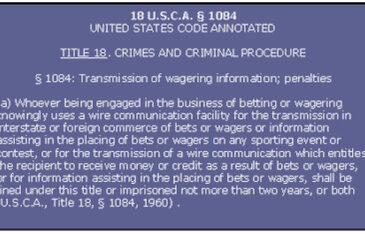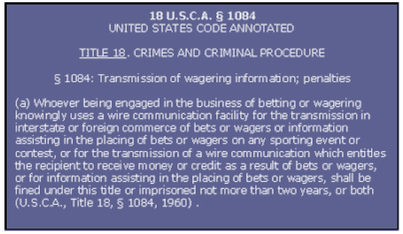The casino industry has embraced online technology. Some observers predict that Internet gambling could become a $10 billon industry (Dwek, 1997) in the next five to ten years (Griffiths, 1999). Regulating internet gambling is challenging, however, as ambiguities in federal laws such as the Interstate Wire Act of 1960 inspire debate over the legality of Internet gambling in the United States and abroad.
Proponents of Internet gambling argue that it is not subject to the Interstate Wire Act of 1960 because such gambling often takes place outside of the United States’ jurisdiction (Schwarz, 1999). Moreover, Internet gambling operators argue that Internet gambling did not exist when Congress enacted the 1960 Interstate Wire Act. Therefore, Congress could not have intended for such a law to apply to internet gambling (Schwarz, 1999).
In 1999, however, arguments such as these were quieted. In the case of People v. World Interactive Gaming Corp., 1999 WL 591955 (N.Y. Sup. Ct. July 22, 1999), it was decided that Internet gambling is in fact illegal under federal law—as well as under state law absent explicit state authorization—as mandated by the Interstate Wire Act of 1960.[1] The specific section of this act by which the People formulated some legal arguments in this case is presented below.
In People v. World Interactive Gaming Corp., 1999 WL 591955 (N.Y. Sup. Ct. July 22, 1999), attorneys for the People argued that the Interstate Wire Act of 1960 was intended to be broadly applied to prevent any and all interstate or international transmission of gambling information to or from the United States using wire communication facilities (H.R. REP. NO. 87-967, 1961, in Schwarz, 1999). Indeed, former U.S. Attorney General Robert F. Kennedy stated, “[t]he purpose of [the Wire Act] is to aid. . . in the suppression of organized gambling activities by prohibiting the use of or the leasing, furnishing, or maintaining of wire communication facilities which are or will be used for the transmission of certain gambling information in interstate and foreign commerce” (H.R. REP. NO. 87-967, 1961, in Schwarz, 1999).
While the language of this act appears unambiguous to some legal scholars, it is not so clear to others. For example, I. Nelson Rose (1999) maintains this case has no absolute bearing on the state of Internet gambling, arguing that most of the opinion rendered involves only a discussion of federal law by a state trial judge. While of intellectual interest, the conclusions reached are not compulsory (Rose, 1999).
Cyberspace attorney Catherine Sansum Kirkman (1998) refers to the misleading language of the law. She writes that the Interstate Wire Act does not apply to individual gamblers because they are not “. . .engaged in the business of betting or wagering. . .” (U.S.C.A., Title 18, § 1084, 1960). Moreover, because Internet service providers are not regulated or licensed by the Federal Communication Commission (FCC)—and as such not mandated to retain a licensed carrier (e.g., telephone service provider) by the FCC to cease and terminate service when gambling occurs through its wires (Kirkman, 1998)—they are not legally bound to the Act’s stipulation regarding “ … a wire communication facility for the transmission in interstate or foreign commerce of bets or wagers. . .” (U.S.C.A., Title 18, § 1084, 1960).
While there remain interpretive differences with regard to the Interstate Wire Act of 1960, certain perplexities within the law are apparent. For example, does the act prohibit only sports betting, (i.e., “… assisting in the placing of bets or wagers on any sporting event or contest…” (U.S.C.A., Title 18, § 1084, 1960)), or does it prohibit other forms of betting as the law’s language suggests (i.e., “… the transmission of a wire communication which entitles the recipient to receive money or credit as a result of bets or wagers…” (U.S.C.A., Title 18, § 1084, 1960))? In addition, how do prosecutors within the United States prove that an Internet gambling operation located outside of United States jurisdiction knows that a specific gambler is from the United States? While the gambler’s identity might be available from electronic data in the form of winnings and billing information, the Internet’s anonymity makes proving a gambler’s intent to illegally gamble via the Internet problematic. Indeed, the burden is on lawmakers and legal scholars to ensure that what is now an ambiguous federal act becomes cogent federal law.
[1] The reader should note that other federal acts under the United States Code were cited in this case. For the purposes of this WAGER, however, only the Interstate Wire Act of 1960 will be examined.
References
Dwek, R. (1997). Is online gambling on or off? Escape, May/June, 48.
Griffiths, M. (1999). Gambling technologies: prospects for problem gambling. Journal of
Gambling Studies, 15(3), 265-283.
Interstate Wire Act, 1084, U.S.C.A. 18 (1960).
Kirkman, S. K. (1998). Gambling on the internet. Doing justice to the web. Available:
http://www.webtechniques.com/archives/1998/03/just/
Rose, N. I. (1999). The major internet gambling case that isn’t. Gambling and the Law. Available: http://www.gamblingandthelaw.com/recent.html
Schwarz, J. M. (1999). The Internet gambling fallacy craps out. Berkeley Technology Law Journal, 14(3).
The WAGER is a public education project of the Division on Addictions at Harvard Medical
School. It is funded, in part, by the National Center for Responsible Gaming, the
Massachusetts Department of Public Health, the Addiction Technology Transfer Center of
New England, the Substance Abuse and Mental Health Services Administration, and the
Center for Substance Abuse Treatment.





